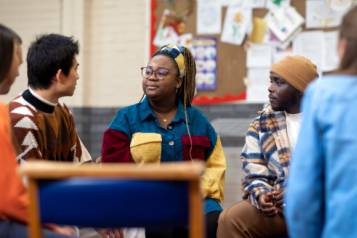We take on a leading role in a new pilot project to reduce health inequalities nationwide with Healthwatch England

With Healthwatch England, we’re piloting a ground-breaking new project aimed at tackling inequalities in health and social care nationwide by using our innovative engagement approach to help local Healthwatch nationwide reduce health inequalities.
For Healthwatch branches to be effective and fully represent the local public opinion, we must engage with all of the communities that exist in our boroughs and regions.
We already know that services work better for some people than others, which is why we’re committed to working with people in different communities around our boroughs so that together, we can reduce health inequalities and improve the standard of services for everyone.
Communities of Interest Project
Following a competitive application process, Healthwatch England has chosen Healthwatch Central West London (HWCWL) to pilot an exciting new project designed to support other local Healthwatch nationwide to develop their approach to community engagement. The project is called ‘Communities of Interest’.
Our leading role in this pilot is due to the effectiveness of an engagement model we designed to effectively engage with people from across our communities in Westminster and Kensington & Chelsea called the ‘Small Grants Programme’.
So that everyone can share their experiences of using health and care services, we’ve constantly been looking to develop new ways of reaching people and the ‘The Small Grants Programme’ is a recent innovation that has significantly shaped the way we collaborate and work with a wide range of minority ethnic groups and other minority groups.
We launched the programme last year following a partnership with the BME Health Forum, where we worked more closely with communities of people who are often underrepresented in conversations about health services. This collaborative approach to community engagement with the BME Forum worked extremely well and led us to develop an initiative that would enable us to work at a more grassroots level in collaboration with local groups to tackle existing inequalities in access and quality of care.
In order to facilitate research and uncover people’s genuine concerns, we provided local, grassroots organisations funding and support.
To read more about the Small Grants Programme click here.
How the pilot will work?
Together, with representatives from five local Healthwatch branches from across the country, we are leading on and facilitating sessions over an 8-week period that will test out new methods of working by expanding knowledge, skills, and approaches to enable effective engagement with specific communities. The project is designed to equip local Healthwatch organisations with the tools they need to engage properly with a community in their area, whilst making sure that people’s experiences of inequality and discrimination are not lost.
Understanding the challenges with community engagement
The sessions we’ve carried out have focused on engagement with people from black African communities. Participants were given the opportunity to share their previous experiences of engaging with this community, their challenges, and what their engagement ambitions were for the future. The focus of each session was to take direct action and participants were encouraged to design concrete plans that would improve their engagement in the future.
We created a supportive but challenging learning environment and each session gave two participants half an hour to focus on how they work. Individuals had ten minutes to describe in detail their journey with the community and what they had done to date, talking about progress and challenges. After this, other participants had the opportunity to ask questions, clarify issues, and make suggestions. Everyone had the opportunity to offer their thoughts, to help others in their thinking and expand their approach.
What did we talk about?
We created a safe space for participants to share their questions, concerns and suggestions about topics they might not have felt comfortable exploring elsewhere. For example, we had conversations regarding feeling fearful about what assumptions a community might make about a Healthwatch member looking to carry out some engagement because of their own ethnicity. This can be a massive barrier to effective engagement, and something that is crucial to speak about.
The group also explored the language we use. For instance, the term ‘black African’ can mean many things for different people. We also spoke about the importance of working in partnership with different communities to ensure that they are fully included in our work and how to best explain what the advantages of engagement are for different communities in our areas.
We’re incredibly proud to be collaborating with Healthwatch England on this project. Our engagement work often involves facilitation and discussion, which are the two major components of the ‘Communities of Interest’ project. We believe that everyone deserves a say in health and social care provision. Nationwide, local Healthwatch organisations play an important part in sharing community voices around how services work and we believe that everyone deserves a say in health and social care provision.
The featured photo of this article was updated on 20 October 2021.

